Samsung SSD 850 EVO (120GB, 250GB, 500GB & 1TB) Review
by Kristian Vättö on December 8, 2014 10:00 AM ESTRandom Read/Write Speed
The four corners of SSD performance are as follows: random read, random write, sequential read and sequential write speed. Random accesses are generally small in size, while sequential accesses tend to be larger and thus we have the four Iometer tests we use in all of our reviews.
Our first test writes 4KB in a completely random pattern over an 8GB space of the drive to simulate the sort of random access that you'd see on an OS drive (even this is more stressful than a normal desktop user would see). We perform three concurrent IOs and run the test for 3 minutes. The results reported are in average MB/s over the entire time.
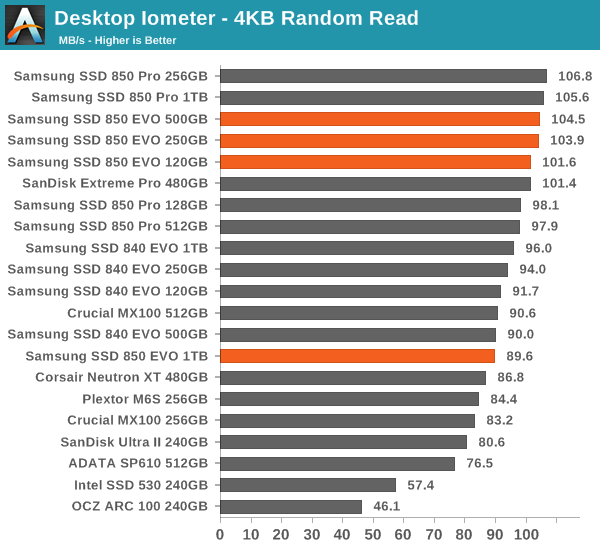
The models with the new MGX controller enjoy excellent random read performance, although the 1TB version isn't bad either. Without knowing the specifications of the MGX controller, it's hard to know what is causing the performance increase, but I still suspect it is due to a higher clock speed.
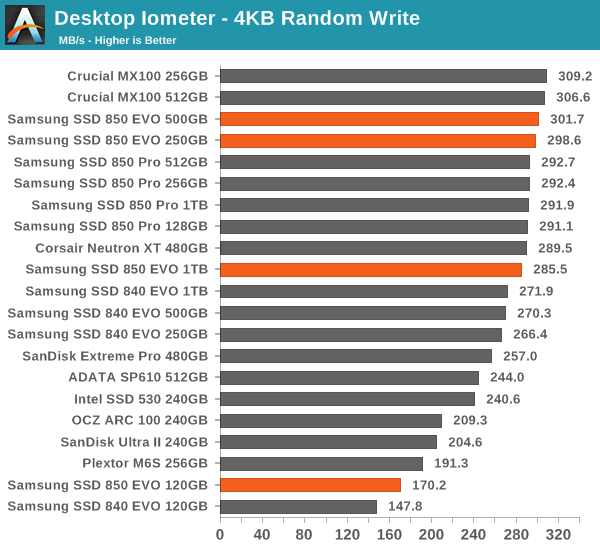
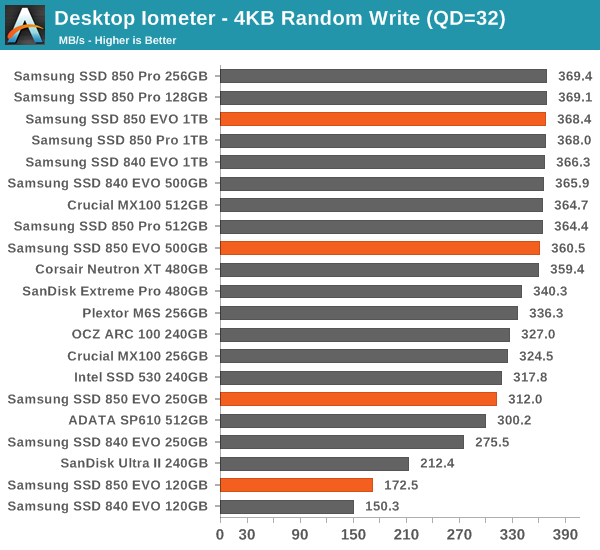
Random write performance also sees an increase across all capacities and is more or less on par with the 850 Pro at larger capacities.
Sequential Read/Write Speed
To measure sequential performance we run a 1 minute long 128KB sequential test over the entire span of the drive at a queue depth of 1. The results reported are in average MB/s over the entire test length.
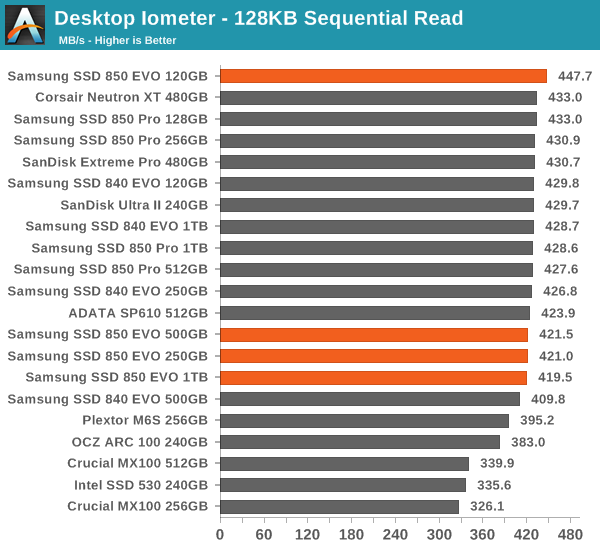
Sequential performance doesn't present any real surprises. Write speed at smaller capacities gets a small boost, but other than that the performance is typical SATA 6Gbps level.
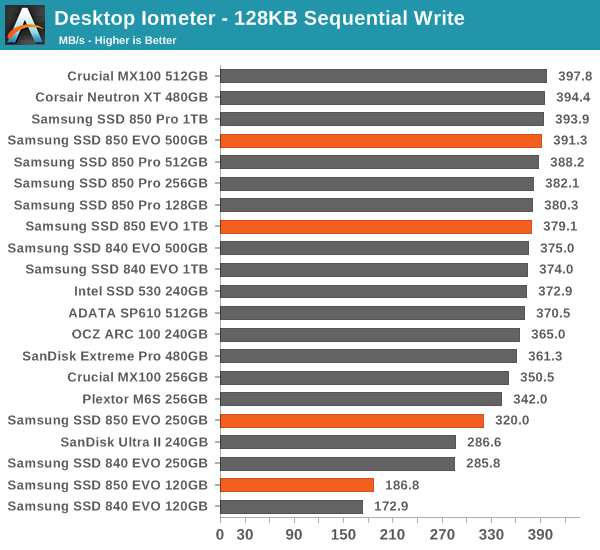
AS-SSD Incompressible Sequential Read/Write Performance
The AS-SSD sequential benchmark uses incompressible data for all of its transfers. The result is a pretty big reduction in sequential write speed on SandForce based controllers, but most other controllers are unaffected.
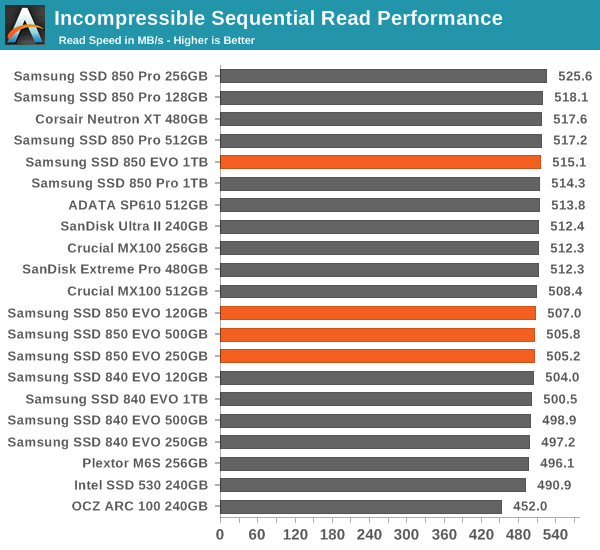
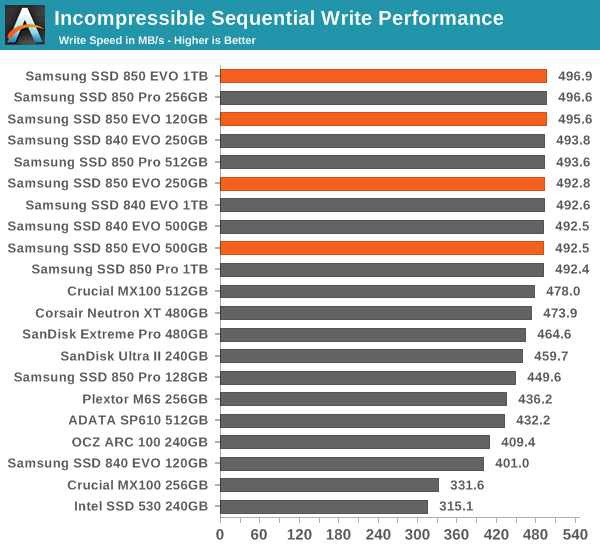










97 Comments
View All Comments
Kevin G - Monday, December 8, 2014 - link
They do seem a little low but we just got out of a major sale spree. During the Black Friday/Cyber Monday shopping fest the 480 GB Intel 730 was going for $200. I would have picked up one up myself at that price but they ran out of stock.HisDivineOrder - Wednesday, December 10, 2014 - link
You'd have been better served with the Sandisk Extreme Pro 480GB for $185.davolfman - Monday, December 8, 2014 - link
OCZ's firmware for the Barefoot3 series of chips the ARC100 uses has a less then stellar reputation. Things like unexpected power loss have been known to put it into a state of progressive corruption only recoverable by secure erase. There have been patches that claim to fix this on my Vector (that probably got applied to the ARC out the door), but I haven't seen anyone test if they're working.Oxford Guy - Wednesday, December 31, 2014 - link
Up to its old tricks, then.Kristian Vättö - Tuesday, December 9, 2014 - link
As listed on the table, the prices were taken on December 7 and were accurate at the time.sheh - Monday, December 8, 2014 - link
Can anyone explain the large discrepancy (not only in this case) in sequential speed between Iometer and AS-SSD?Kristian Vättö - Tuesday, December 9, 2014 - link
It's because of TurboWrite. Iometer is a time based tool and the sequential tests are run for one minute, which means that the TurboWrite buffer will be filled and thus the performance goes down as data is written to the TLC array. AS-SSD, on the other hand, only writes a gigabyte of data so it all gets written to the fast SLC cache.sheh - Friday, December 12, 2014 - link
Thanks. I'll have to reread older reviews, but I think there's a similar behavior also on other drives that do not have a fast temporary buffer?maecenas - Monday, December 8, 2014 - link
I saw the 840 EVO 500gb going for $180 over the black Friday - cyber Monday period. It'll interesting to see if Samsung keep the 840 EVO on the market as a the low end, so the 850 EVO can fill the mid-range portion of the market while the 850 Pro serves the high end.Laststop311 - Monday, December 8, 2014 - link
Prices are kinda crappy. Why go with an 850 evo when u can spend 20-30 dollars more and get an 850 pro?